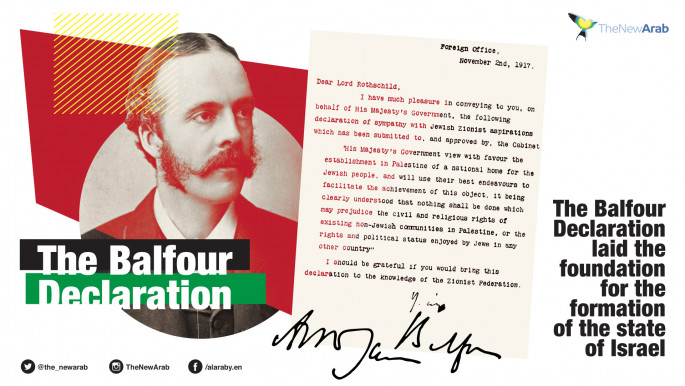UK refuses to apologise for Balfour Declaration
The British government responded to the Balfour Apology Campaign headed by the Palestinian Return Centre (PRC) by refusing to apologise for the 1917 Balfour Declaration that was seminal in the subsequent creation of the state of Israel.
The weekend response came after a petition was launched in February by the PRC, urging the British government to "openly apologise to the Palestinian people for issuing the Balfour Declaration".
Pietro Stefanini, researcher and advocacy coordinator at PRC spoke to The New Arab about the campaign.
"We are calling on the British government to officially recognise its role in the ongoing plight of the Palestinian people by making an apology for issuing the Balfour Declaration, which directly led to the mass displacement of the Palestinian nation," Stefanini told The New Arab.
The Balfour Declaration was a statement issued in November 1917 by the then British Foreign Secretary Arthur Balfour that pronounced the British government favoured and would facilitate the establishment "in Palestine of a national home for the Jewish people", caveated however with the condition that no prejudice befall on non-Jewish communities in the country.
The declaration itself has been widely recognised as a major milestone of British colonial policy in the Middle East between 1917 and 1948 and one which paved way for the creation of Israel.
 |
Following the end of the British Mandate in Palestine, Israel declared independence in 1948 after the UN General Assembly voted in 1947 in favour of a plan, rejected by Palestinian representatives, to partition Palestine into a Palestinian state and a Jewish state.
The subsequent establishment of Israel saw a major displacement of Palestinian living in the region with hundreds of thousands either fleeing or being forcefully expelled.
Refugee camps of expelled Palestinians as well as their descendants remain until today in neighbouring Arab countries, including Jordan and Lebanon.
The parliamentary petition by the PRC urged the British government to "recognise its role during the Mandate" and "must lead attempts to reach a solution that ensures justice for the Palestinian people".
Stefanini believes that the British government is in "complete denial" over its "colonial crimes" in Palestine and the continued biased support for "Israel's apartheid regime of oppression and domination" shows that the British government needs to recognise "its responsibilities towards Palestinians if it is going to positively contribute peace and justice".
There were numerous unsuccessful attempts to sabotage the campaign by accusing it of anti-Semitism, Stefanini said.
"A parliamentary investigation recently showed accusations [of anti-Semitism] were all fabricated by pro-Israel groups and the Israeli embassy in London," he told The New Arab.
"Nonetheless, instead of sabotaging the campaign, we believe this gave more media attention to campaign which has received interest and support from all around the world," Stefanini said.
Having received over 10,000 signatures, the petition guaranteed an official response from the British government.
"The Balfour Declaration is an historic statement for which HMG does not intend to apologise," the British government response said.
It added that the establishment of a homeland for the Jewish people was a "right and moral thing to do, particularly against the background of centuries of persecution".
"We are proud of our role in creating the State of Israel. The task now is to encourage moves towards peace."
The statement placed the Declaration in the context of Imperial rivalries in the first decades of the 20th century and Ottoman decline and nodded to official government support for the two-state solution.
It said that the British governments recognised that "the Declaration should have called for the protection of political rights of the non-Jewish communities in Palestine, particularly their right to self-determination".
Stefanini said the government's response is nothing new.
"We had already received similar responses from the government not too long ago. This only motivates us more to continue campaigning on this matter. Future governments will not be able to ignore this issue if appropriate pressure is applied," he said.
"We are also going to mobilise support for the campaign in other countries, we want to create an international day of action to pressure Britain to recognise its responsibilities," Stefanini told The New Arab.
"We are considering creating an unofficial truth commission led by civil society to raise awareness about the legacy of Britain's occupation of Palestine. We are also looking at legal avenues to hold Britain accountable for its colonial crimes."
Britain plans to hold celebrations along with Israeli officials to mark the November 2 centenary of the Balfour Declaration.
Palestinian campaigners have long condemned the Balfour declaration as a pledge issued by a British government that gave away land it did not own.



